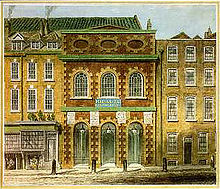

The Royal Academy of Music was a company founded in February 1719, during George Frideric Handel's residence at Cannons, by a group of aristocrats to secure themselves a constant supply of opera seria. It is not connected to the London conservatoire with the same name, which was founded in 1822.
It commissioned large numbers of new operas from three of the leading composers in Europe: Handel, Attilio Ariosti and Giovanni Bononcini.[1] The Academy took the legal form of a joint-stock corporation under letters patent issued by George I of Great Britain for a term of 21 years with a governor, a deputy governor and at least fifteen directors.[2] The (first) Royal Academy lasted for only nine seasons instead of twenty-one, but both the New or Second Academy and the Opera of the Nobility seem to have operated under its Royal Charter until the expiry of the original term.[3]
Handel was appointed as Master of the orchestra responsible not only for engaging soloists but also for adapting operas from abroad and for providing possible libretti for his own use, generally provided from Italy.[4]
Initially the librettist Paolo Antonio Rolli was the "Italian secretary of the Academy";[5] he was replaced by Nicola Francesco Haym within a few years.
- ^ Dean, W. & J.M. Knapp (1995) Handel's operas 1704–1726, p. 298.
- ^ "Handel Reference Database 1719". Ichriss.ccarh.org. Retrieved 2 February 2013.
- ^ Dean, W. (2006) "Handel's Operas, 1726–1741", pp. 125, 274, 399.
- ^ Strohm, Reinhard (20 June 1985). Essays on Handel and Italian opera by Reinhard Strohm. ISBN 9780521264280. Retrieved 2 February 2013 – via Google Books.
- ^ Schoelcher, Victor (1857). "The life of Handel by Victor Schoelcher". Retrieved 2 February 2013 – via Google Books.